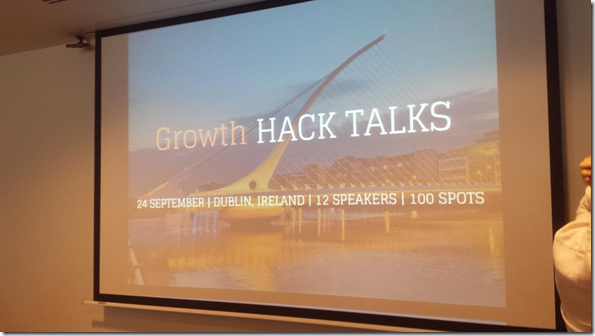Yesterday I jumped on a plane and headed across to Ireland after being personally invited to Growth Hack Talks by a friend of mine, Ben Cotton. He managed to convince me to get off my backside, jump on a plane and go and listen to a few other clever marketing people speak for once. The reason I decided to go was because it was on a subject, which had caught my eye, and which is still relatively new to us here in the UK. If you want to be successful in the marketing space you have to keep looking out for new innovations in the industry and this is one, albeit one with a new funky name anyway. For those of you that don’t know what Growth Hacking actually is, according to Wikipedia, this is the definition:
Growth hacking is a marketing technique developed by technology startups which uses creativity, analytical thinking, and social metrics to sell products and gain exposure.[1][2] It can be seen as part of the online marketing ecosystem, as in many cases growth hackers are using techniques such as search engine optimization, website analytics, content marketing and A/B testing. Growth hackers focus on low-cost and innovative alternatives to traditional marketing, e.g. utilizing social media and viral marketing instead of buying advertising through more traditional media such as radio, newspaper, and television.[3] Growth hacking is particularly important for startups, as it allows for a “lean” launch that focuses on “growth first, budgets second.“[4][5] Facebook, Twitter, LinkedIn, Airbnb and Dropbox are all companies that use growth hacking techniques.
The list of speakers he had prepared was very impressive including brands like Hubspot, Uber, Google, AdRoll, The AA and many more. This was the inaugural event but it was well organised, sold out, and the range of topics they covered was rather fascinating. To simply hear how Uber had focussed on growth in the various cities across the world was captivating – we were even told about Uber’s close examination of the food delivery market which will be creating a whole host of new problems for them as they have now decided to pilot moving into this space.  Themes in Growth Hacking I noticed a strong theme of robust company culture coming through the talks, in all of these fast growing start-ups, each had a clear vision and an innovative culture. As one speaker said “Culture is not just about the Ping Pong tables – they are easy to replicate.” He covered the fact that the best employees are the ones that buy into the culture and properly align themselves with your brand. I completely agree with this, as a PR agency owner I understand how competitive it can be to identify, hire and retain brilliantly talented individuals. It’s not just a problem for marketing agencies north of the M25, it’s also a problem for companies over in Dublin, and even for agencies in Sydney Australia according to my colleague. The theme running through the discussions was to always ensure you have a strong vision, values, good people and then focus your marketing where your big fish are swimming. Is Content still King? The HubSpot presentation from Matthew Barby was probably the closest to something, I might cover in my lectures, as he looked at clever content marketing but rather than talking theory he gave proper hacks to the audience about how you can really focus your content efforts instead of churning out reams and reams of crap content as many brands often do. He said, you should focus on the data that delivers the most traffic and the most effective traffic, in other words the traffic that delivers leads or conversions. Then when you know what delivers the best leads/conversions and the most traffic, start testing your clever content ideas with that data as your new content model and then scale it upwards and you should get phenomenal results if you stay alligned to the data. This is something we do for clients a lot, data is sadly still often seen as a geeky element, but it’s the key differentiator from being a good marketer or PR person to a great one. We need to use the data because then we know what works – it’s a very simple concept. I have included some of the presentations below and will add more as they are uploaded to Slideshare and I have picked some of my favourite comments, tweets and hacks which were shared whilst i was at the event. Here are my 44 most interesting comments and hacks from the day:
Themes in Growth Hacking I noticed a strong theme of robust company culture coming through the talks, in all of these fast growing start-ups, each had a clear vision and an innovative culture. As one speaker said “Culture is not just about the Ping Pong tables – they are easy to replicate.” He covered the fact that the best employees are the ones that buy into the culture and properly align themselves with your brand. I completely agree with this, as a PR agency owner I understand how competitive it can be to identify, hire and retain brilliantly talented individuals. It’s not just a problem for marketing agencies north of the M25, it’s also a problem for companies over in Dublin, and even for agencies in Sydney Australia according to my colleague. The theme running through the discussions was to always ensure you have a strong vision, values, good people and then focus your marketing where your big fish are swimming. Is Content still King? The HubSpot presentation from Matthew Barby was probably the closest to something, I might cover in my lectures, as he looked at clever content marketing but rather than talking theory he gave proper hacks to the audience about how you can really focus your content efforts instead of churning out reams and reams of crap content as many brands often do. He said, you should focus on the data that delivers the most traffic and the most effective traffic, in other words the traffic that delivers leads or conversions. Then when you know what delivers the best leads/conversions and the most traffic, start testing your clever content ideas with that data as your new content model and then scale it upwards and you should get phenomenal results if you stay alligned to the data. This is something we do for clients a lot, data is sadly still often seen as a geeky element, but it’s the key differentiator from being a good marketer or PR person to a great one. We need to use the data because then we know what works – it’s a very simple concept. I have included some of the presentations below and will add more as they are uploaded to Slideshare and I have picked some of my favourite comments, tweets and hacks which were shared whilst i was at the event. Here are my 44 most interesting comments and hacks from the day:
- Focus on your company vision and brand values first so you can entice your new employees with what makes you different
- Use your networks. When looking for staff, the best people come from referrals from people who get your company
- “Engaged employees drive innovation, and proactively help move your company forward – even during difficult times
- The best employees are the ones that are referred to you from your networks. Don’t poach people!
- Every part of your business should be motivated to drive innovation, conceive ideas and execute quickly
- Don’t date your blog content – it is proven to reduce its reach
- Make sure your blog articles have between 11-14 words in the titles of your blog posts
- When articles included the word ‘template’ in the title, the average number of Tweets increased by 115% – HubSpot
- Matching user search experience to the end result had an 240% increase in conversion on one post alone
- Content Lead Optimisation: Take your high traffic blog posts with relatively low conversion and re-optimise them
- Articles between 2,250 and 2,500 earned by far the most shares
- Longer posts of between 2,000-2,500 perform far better than shorter punchy articles
- Crowd funding is now being replaced by tribe funding
- Carefully identify and engage key influencers in your chosen location
- Place your growth bets: Spend 20% trying new things (like events, or other things that stand out).
- Real Culture is the sum of your employees’ behaviour and their hunger
- 46% of your monthly blog leads could be coming from just 2% of your articles
- Leverage the communities of influencers to scale your lead generation. From porn stars to fashion bloggers!
- 90% of apps that are downloaded are free not paid!
- Blogging delivers an ROI but content marketing must be viewed as a slow return.
- Give one get one is Uber’s core strategy.
- Make bold statements on your blog – opinions are what matter
- Culture is not free beer and ping pong and other things that are contrived and easy to replicate
- Growth hacking is simple. Think like a drug dealer… Free trials, great partners, incentivised referrals
- It’s about entertaining people who should be working
- Engage with tribes on Twitter through specific #hashtags, track different channels as each tribe uses different platforms
- Analyse data to make future content decisions’
- Experiment with how much engagement you can get around a topic on social media before you crowd fund
- 9 out of 10 companies don’t feel like they have control of their data. 84% of 1,000 said they don’t trust the cloud
- Identify and mitigate pain points, create valuable content, then partner strategically
- Offline events amplify our online activities. It strengthens the bond, & also helps raise money
- Get influencers on board, cheapest advertising money can buy. It’s a quick, effective way of generating brand awareness. Identify them with tools such as BuzzSumo, Klout and Topsy
- 1 in 4 apps that are downloaded are never used. Need to focus on ease of use, be consistent across devices, and generate new content, test everything simply online
- Don’t write topical content as the leads will start coming from content a month later anyway – aim for Evergreen content
- Trial products online first, test, measure and streamline to the ones which are the most effective
- Find people who are active in the areas where you want to be. Invite influencers and absorb them into your content, and they will share it for you
- Borrow their audience and pay the influential people to be influential for you
- Write about what you’re an expert on, and what you can be authentic about. You’ll get found out quickly otherwise”
- Most marketing tactics have diminishing returns, but with evergreen content you get constant, on-going engagement
- Benefit of blogging is clear, not a chore. We write about all kinds of things; they’re just good editorial piece
- 15% of readers go on to visit our marketing pages from the blog, customers who engage with it first have higher retention
- Every part of the business @eventbrite is motivated to drive innovation, conceive ideas and execute quickly”
- Offline experiences make us happier; the happiness we derive from experiences increases over time
- There is no silver bullet. You apply many small bullets rigorously and scientifically to achieve growth!
I hope you have found this review of the event useful, thanks to everyone for their tweets and comments, if you think I have missed something let me know your growth hack in the comments.
Chris Norton is the founder of Prohibition and an award winning communications consultant with more than twenty years’ experience. He was a lecturer at Leeds Beckett University and has had a varied PR career having worked both in-house and in a number of large consultancies. He is an Integrated PR and social media blogger and writes on a wide variety of blogs across a huge amount of topics from digital marketing, social media marketing right through to technology and crisis management.


